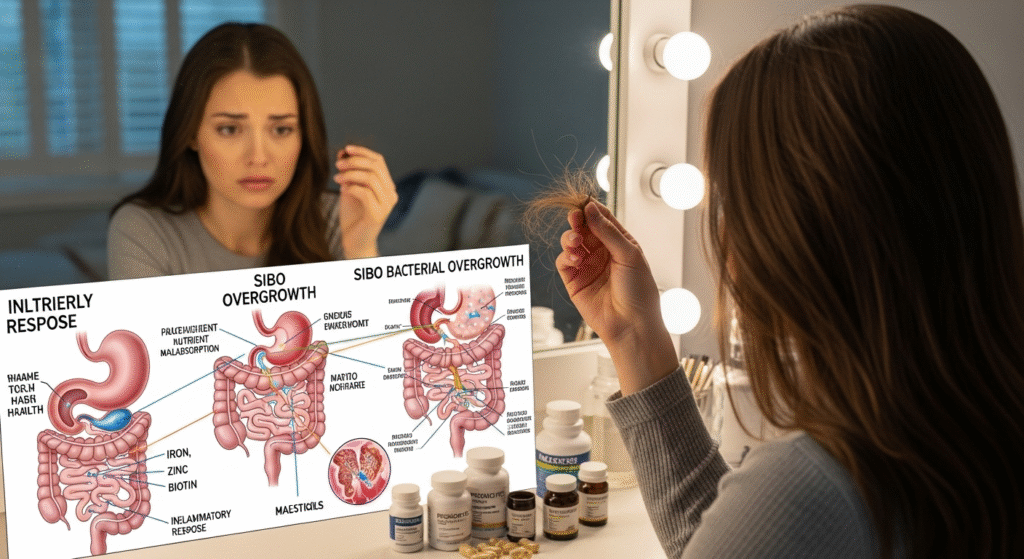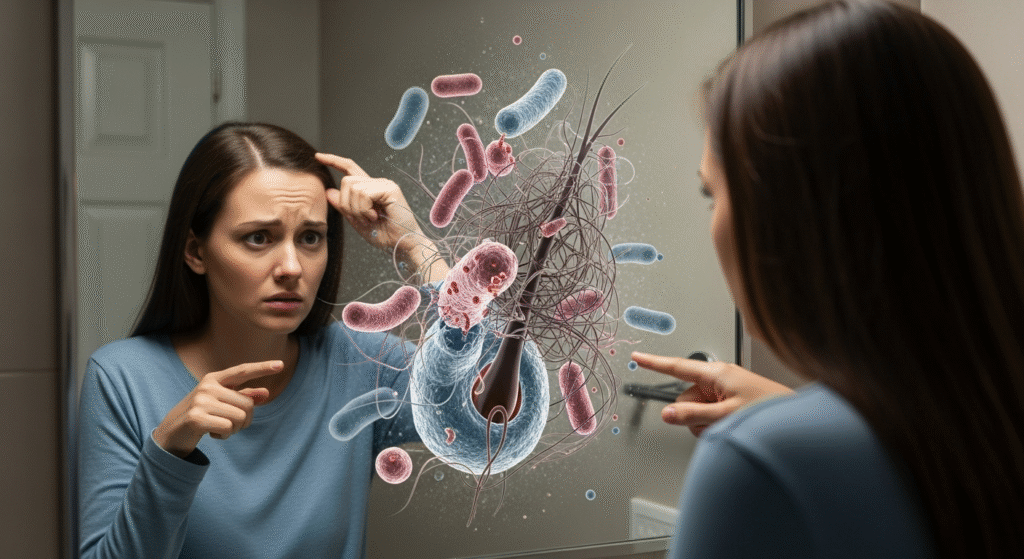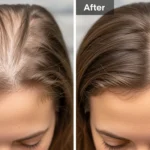Are you experiencing unexplained hair loss? If so, it’s important to look beyond the usual causes and consider gut health as a potential factor. One condition that might be affecting both your digestive system and your hair is Small Intestinal Bacterial Overgrowth (SIBO). In this article, we’ll explore whether Can SIBO Cause Hair Loss?, how …
Are you experiencing unexplained hair loss? If so, it’s important to look beyond the usual causes and consider gut health as a potential factor. One condition that might be affecting both your digestive system and your hair is Small Intestinal Bacterial Overgrowth (SIBO).
In this article, we’ll explore whether Can SIBO Cause Hair Loss?, how it impacts your body, and what you can do to manage both conditions. By understanding the link between gut health and hair loss, you can take actionable steps towards better health.

What Is SIBO and How Does It Affect the Body?
Understanding Small Intestinal Bacterial Overgrowth (SIBO)
SIBO occurs when there is an abnormal increase in the number of bacteria in the small intestine. Under normal circumstances, the majority of bacteria in your gut reside in the large intestine. However, in SIBO, bacteria from the large intestine move into the small intestine, where they cause inflammation, disrupt normal digestion, and interfere with nutrient absorption.
SIBO’s Impact on Digestion and Nutrient Absorption
A key issue with SIBO is its effect on nutrient absorption. The bacteria in the small intestine produce gases and toxins that disrupt the proper breakdown of food. This can lead to nutrient deficiencies in essential vitamins and minerals, such as biotin, vitamin D, and iron, all of which are crucial for maintaining healthy hair growth.
Common Symptoms of SIBO
SIBO often presents with a variety of digestive symptoms, including:
- Bloating
- Diarrhea
- Constipation
- Abdominal discomfort
While these symptoms are primarily digestive, SIBO’s interference with nutrient absorption can have a far-reaching impact on your overall health, including your hair.
Can SIBO Cause Hair Loss? The Connection Explained
How SIBO Disrupts Nutrient Absorption and Leads to Hair Loss
Hair loss can be linked to the nutritional deficiencies that often accompany SIBO. The bacteria in the small intestine consume and deplete vital nutrients that are required for healthy hair growth.
Specifically, biotin, iron, and vitamin D deficiencies are most commonly associated with hair loss. When these nutrients are not adequately absorbed, hair follicles are deprived of the nourishment they need to remain healthy, potentially leading to thinning hair or excessive shedding.
The Role of Gut Health in Hair Growth
There is growing evidence to suggest that gut health plays a significant role in overall hair health. The gut microbiome not only affects digestion but also impacts the immune system, hormones, and even the body’s ability to absorb nutrients.
A disrupted microbiome, such as that caused by SIBO, can contribute to inflammation and further hinder nutrient absorption, creating a vicious cycle that affects your hair.
Nutrient Deficiencies Linked to SIBO and Hair Loss

Biotin Deficiency and Its Effect on Hair Health
Biotin, a B-vitamin that plays a vital role in hair growth, is often deficient in individuals with SIBO. Biotin helps produce keratin, the protein responsible for hair strength and growth. When biotin is lacking, it can lead to brittle hair, shedding, and overall slower hair growth.
Iron Deficiency and Anemia’s Role in Hair Loss
Iron deficiency is another common issue for those with SIBO. The bacteria in the small intestine can interfere with iron absorption, leading to anemia. Anemia results in reduced oxygen delivery to hair follicles, which can weaken hair growth and increase the likelihood of hair thinning.
Vitamin D Deficiency and Its Impact on Hair Follicles
Vitamin D is crucial for hair follicle cycling and healthy hair growth. A lack of vitamin D can contribute to hair shedding and thinning. Studies have shown that individuals with low vitamin D levels are more prone to conditions like alopecia areata, an autoimmune disorder that causes hair loss. Since SIBO can disrupt vitamin D absorption, it further exacerbates the risk of hair loss.
How to Manage SIBO and Prevent Hair Loss
Treating SIBO: Antibiotics and Dietary Changes
SIBO is commonly treated with antibiotics, such as rifaximin, which help reduce the bacterial overgrowth in the small intestine. Additionally, dietary changes, including adopting a low FODMAP diet, can help reduce symptoms and control bacterial growth. It’s essential to consult a healthcare provider to determine the best treatment plan for your specific condition.
Improving Nutrient Absorption to Support Hair Health
In addition to treating SIBO, improving nutrient absorption is key to addressing hair loss. This can be achieved through:
- Supplements: Take supplements that address specific deficiencies, such as biotin, iron, and vitamin D.
- Gut-healing foods: Include foods like bone broth, fermented vegetables, and fiber-rich foods to support gut health.
- Probiotics: Consider using probiotics to help restore balance in the gut microbiome.
Hair Care Tips for Those with SIBO-Induced Hair Loss
While treating SIBO and addressing nutrient deficiencies, it’s also essential to care for your hair:
- Use gentle, sulfate-free shampoos.
- Avoid excessive heat styling or chemical treatments that may weaken the hair.
- Consider scalp massage to promote blood circulation to hair follicles.
FAQs
Can treating SIBO reverse hair loss?
Yes, treating SIBO and addressing nutrient deficiencies can reverse hair loss, although the process may take time.
What other conditions can cause hair loss similar to SIBO?
Conditions such as hypothyroidism, autoimmune diseases, and chronic stress can also lead to hair loss.
How long does it take to see hair regrowth after treating SIBO?
Hair regrowth can take anywhere from 3 to 6 months after treating the underlying SIBO and restoring nutrient levels.
Are there specific foods that help with SIBO-related hair loss?
Yes, consuming nutrient-dense foods such as leafy greens, lean proteins, and probiotic-rich foods can help with SIBO-related hair loss.
Conclusion
SIBO and hair loss are linked through nutrient deficiencies that disrupt hair growth. However, by treating SIBO and improving nutrient absorption, you can significantly improve your hair health. If you suspect that SIBO may be affecting both your gut and your hair, consult a healthcare provider to begin treatment.
If you’re struggling with hair loss and think SIBO could be the cause, book a consultation with Dr. Uzma Irfan, an ISHRS-certified surgeon in Islamabad today. Get personalized guidance on managing both your gut health and hair growth for a healthier you.






